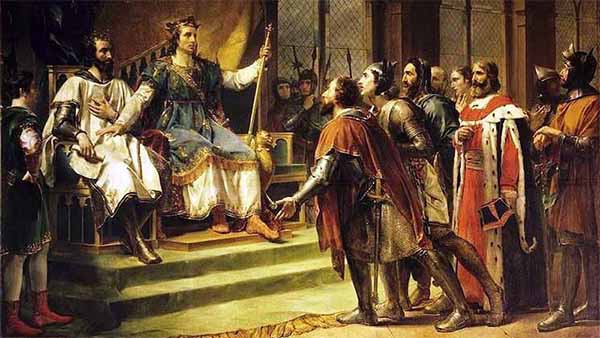Were Capetian Dynasty Kings Usurpers of the Crown of France ?

Hugh Capet founded a dynasty which would reign over France for eight hundred years, the House of France. Elected king in place of the legitimate successor of the last Carolingian, did he seize the crown more than he deserved it?
In May 987, Louis V, then 20 years old, died while on a hunting trip. The young king did not have a child. Then began a crisis of succession to the throne of France. His uncle Charles of Lorraine is the legitimate heir to the crown, but an assembly made up of the great of the kingdom, that is to say about fifteen bishops, a few territorial princes and as many dukes, designates Hugh Capet as king of France.
The election of a king rather than hereditary succession is part of an ancient Frankish custom, but, a mere formality under the early Carolingians, it very quickly became an object of bitter bargaining between the great. Already, it had brought to power the direct ascendants of Hugh Capet, the Robertians, by injuring the interests of the Carolingian legitimists.
Barely elected, and anxious to establish a power that is still fragile, Hugh Capet hastens to demand that his son Robert also be crowned king so that upon his death, he succeeds him. In doing so, he established the hereditary dynasty of the Capetian kings, and after him it will be certain that there will be no other legitimate king on the throne of France except the one appointed by the inheritance. Yet Hugh Capet not only was elected, but he was to the detriment of Charles of Lorraine, whom the inheritance rightly designated as Louis V's successor …
A quarrel between historians
From now on, the kingdom's historians will have to endeavor to justify the advent of Hugh Capet and, above all, to dispel suspicions of usurpation. The death of Louis V without a direct heir was a strong argument, with him naturally extinguished the Carolingians. As for Charles of Lorraine, we highlight his too great subjection to the Germanic Emperor who had granted him the Duchy of Lower Lorraine, before making him purely and simply disappear from the chronicles.
But soon a Historia Francorum appeared in Sens which offered a completely different version of the affair by making Charles of Lorraine the brother, and no longer the nephew, of Louis V. It called into question the accession to the throne of Hugh Capet who necessarily owes his crown to some intrigue, to the detriment of Charles, the legitimate heir. The Historia Francorum was to create followers who all presented the Capetian dynasty as sitting on the forfeiture.
Backfires are quickly lit, other stories are written, this time favorable to the Capetians. Once again Charles of Lorraine is passed over in silence, Hugh Capet is even made the husband of the daughter of the last Carolingian. Above all, the chroniclers insist on the genealogy of the one who, through his mother Hedwige and his grandmother Matilda, descended from Charlemagne. A sinuous genealogy certainly, but exact in substance, which must suffice to legitimize the coronation of Hugh Capet, a natural, albeit indirect, descendant of Charlemagne. Presented in this way, the Capetian dynasty is therefore only the logical and genealogical continuation of the Carolingian dynasty.
The timely intervention of God
On the day of the coronation, Hugh Capet did not fail to proclaim that he was becoming king "by divine favor", and that he would endeavor to keep the bishops their "canonical privilege", these same bishops who had made him king… And it is precisely the Church which spread the legend according to which Saint Valéry and Saint Riquier had come in a dream to Hugh Capet when he was still only Duke of Paris. The relics of the saints had been protected from Norman looting, but once the danger had passed the monks of the monastery of Saint-Bertin did not want to return them. Hugh promised the two saints to intercede on their behalf, which he did, and in a new dream Saint Valéry rewarded him by granting him and his seven successors to reign over France. God's intervention could not fail to cut short the quarrels of historians! Not only was the Capetian dynasty well established, but it was also so by the will of God.
The divine intercession will be even more manifest when the Capetian king Louis IX becomes Saint Louis. We will then forget the quarrels of legitimacy and we will no longer think too much about the founder of the Capetian dynasty, and the suspicious conditions of his accession to the throne.
The place of a tomb
When the monarchy made the Basilica of Saint-Denis the tomb of the kings of France, a reorganization of the arrangement of the tombs was necessary to reconcile the Merovingians, the Carolingians and the Capetians in a single line. Indeed, from 1263 to 1267, Saint Louis had placed the tombs of the Capetian kings in the north; to the south, those of the Carolingian kings; in the center, those of Philip Augustus, Louis VIII and his own. But, from 1306, Philip the Fair modified this plan and moved four Carolingian tombs that he installed alongside the Capetians, thus highlighting on the one hand the lineage of the Carolingians and the Capetians, and, on the other hand, the unity of the French monarchy.









































































































































































































































































































































